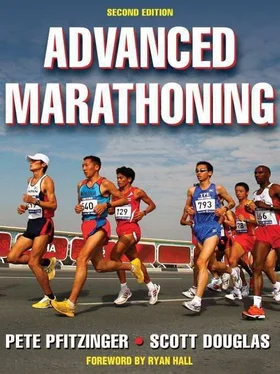Pfitzinger Pete - Advanced Marathoning
Здесь есть возможность читать онлайн «Pfitzinger Pete - Advanced Marathoning» весь текст электронной книги совершенно бесплатно (целиком полную версию без сокращений). В некоторых случаях можно слушать аудио, скачать через торрент в формате fb2 и присутствует краткое содержание. Год выпуска: 2008, Издательство: Human Kinetics - A, Жанр: Спорт, на английском языке. Описание произведения, (предисловие) а так же отзывы посетителей доступны на портале библиотеки ЛибКат.
- Название:Advanced Marathoning
- Автор:
- Издательство:Human Kinetics - A
- Жанр:
- Год:2008
- ISBN:нет данных
- Рейтинг книги:5 / 5. Голосов: 1
-
Избранное:Добавить в избранное
- Отзывы:
-
Ваша оценка:
- 100
- 1
- 2
- 3
- 4
- 5
Advanced Marathoning: краткое содержание, описание и аннотация
Предлагаем к чтению аннотацию, описание, краткое содержание или предисловие (зависит от того, что написал сам автор книги «Advanced Marathoning»). Если вы не нашли необходимую информацию о книге — напишите в комментариях, мы постараемся отыскать её.
Advanced Marathoning — читать онлайн бесплатно полную книгу (весь текст) целиком
Ниже представлен текст книги, разбитый по страницам. Система сохранения места последней прочитанной страницы, позволяет с удобством читать онлайн бесплатно книгу «Advanced Marathoning», без необходимости каждый раз заново искать на чём Вы остановились. Поставьте закладку, и сможете в любой момент перейти на страницу, на которой закончили чтение.
Интервал:
Закладка:
Alcohol (ethyl alcohol) primarily affects your brain. One or two drinks temporarily lead to reduced tension and relief from stress. In the short term, they will also increase dehydration. According to the most recent position statement on hydration from the American College of Sports Medicine, over the course of 24 hours the initial dehydration is offset by less urine output, and the diuretic effect of a small amount of alcohol is negated. Where to strike the balance? The night before your marathon, reduced tension is a good thing, but as discussed earlier, any amount of dehydration is detrimental to running performance. With this in mind, it’s best to limit yourself to one or, at the most, two beers or one glass of wine the night before the marathon. Take in enough extra fluid to make up for the dehydrating effect of the alcohol. Drink an extra ounce (30 ml) of water for each ounce of beer and an extra 3 ounces (90 ml) of water for each ounce of wine that you drink. The same guideline holds for the night before a long run.
After training or racing, wait until you’re reasonably well rehydrated to enjoy a postrun potable. Imbibing while you’re still dehydrated from running will slow your recovery. And right before training or racing, well, let’s not go there.
In its 2005 consensus on hydration, the American College of Sports Medicine wrote, “Caffeine ingestion has a modest diuretic effect in some individuals but does not affect water replacement in habitual caffeine users, so caffeinated beverages (e.g., coffee, tea, soft drinks) can be ingested during the day by athletes who are not caffeine naïve.” In other words, if you’re used to it, moderate ingestion of caffeine does not increase urine output more than a similar amount of water (Armstrong et al. 2005).
If you are not used to caffeine, there may be a mild diuretic effect in the short term, but then a compensatory mechanism results in your holding on to more water over the ensuing 24 hours. This means there is no significant diuretic effect from a cup of coffee or tea, and a cup of coffee or tea on the morning of the race is fine. In fact, if you’re used to having a cup of coffee each morning, abstaining from coffee could have a detrimental effect on your performance because of the withdrawal effects of caffeine deprivation.
In 2005, WADA, the World Anti-Doping Agency, took caffeine off its list of banned substances. Several studies have found performance-enhancing benefits from caffeine ingestion, several others have found no effect of caffeine ingestion on endurance performance, and at least one study found caffeine ingestion to be related to reduced performance. The differences in these results may be partly explained by differences in individuals’ responsiveness to caffeine and the nuances of the study designs.
Extrapolating from run-to-exhaustion studies in the lab, the likely benefit of taking caffeine is in the range of 1 to 2 percent (perhaps 20 to 50 seconds in a 10K or 90 seconds to 4 minutes in a marathon). Caffeine may not work as well during races as in lab tests because one of its effects is an increase in epinephrine (adrenaline) levels, which are also stimulated by the excitement of competition, so the caffeine effect may be reduced during a race.
The effects of caffeine that may boost performance for marathoners are a glycogen-sparing effect, an increase in the release of calcium in muscle fibers, and stimulation of the central nervous system. Ingesting caffeine mobilizes fatty acids that allow you to use more fat and less glycogen at a given pace, meaning your glycogen stores last longer. Instead of your hitting the wall at 23 miles (37 km) because of glycogen depletion, caffeine ingestion could theoretically allow your glycogen stores to last the full marathon distance.
The primary effect of caffeine in improving endurance performance may be stimulation of the central nervous system, which increases alertness and concentration. There is intriguing evidence that central nervous system stimulation reduces perception of effort so that a given pace feels easier.
Our view is that runners should use caffeine only if they are already trying every other legal option to improve running performance. This includes training hard and intelligently, having an excellent diet, and working to optimize all the other lifestyle factors that influence running performance. If you are doing everything else right, and your personal ethics permit it, then a low dose of caffeine may allow you to gain a small improvement in performance.
The side effects of caffeine include headaches, dizziness, anxiety, nervousness, gastrointestinal distress, and heart palpitations. Caffeine is also a mild laxative, which can be particularly inconvenient during a race.
Athletes vary widely in their sensitivity to, and tolerance of, caffeine, so you are an experiment of one. If you do not regularly consume caffeine, you will likely be more sensitive to the effects. If you decide to use caffeine for your marathon, practice using it during your longest training run to see how your body responds.
Attempting to do high-mileage or high-intensity training in hot weather is a physiological challenge that requires you to be flexible with your training schedule. By planning your training, you can minimize the impact of hot weather. Start each workout fully hydrated by making rehydration a priority after the previous day’s run. Run at the time of day when the weather is the least taxing on your body. On a hot, humid day, slow your pace from the outset rather than waiting until your body forces you to slow.
The main fuels for endurance exercise are carbohydrate and fat. Protein also provides a small amount of energy. Carbohydrate supplies the majority of energy during exercise, and fat supplies the bulk of the remainder. If you want to run 26.2 miles (42.2 km) at a good pace, you had better like carbohydrate foods because they’ll be the mainstay of your diet during day-to-day training and especially in the few days before the marathon.
Even if you’re a gaunt marathoner, your body has a large stockpile of energy in the form of fat. A 140-pound (63 kg) runner with a body-fat level of 6 percent still carries around 8.4 pounds (3.8 kg) of fat. Each pound of fat supplies 3,500 calories of energy, so this individual has more than 29,000 calories stored as fat.
For the purposes of fast marathoning, of course, what matters are your carbohydrate, not fat, stores, and your carbohydrate reserves are much more limited. If you do a good job of carbohydrate loading, you can store about 2,000 to 2,500 calories of glycogen (the body’s storage form of carbohydrate).
When you run, your body burns a mixture of carbohydrate and fat. The harder you run, the higher the proportion of carbohydrate you use; the slower you run, the higher the proportion of fat you use. During walking, more than half of the calories you burn are provided by the breakdown of fat. As your pace increases, you use proportionately less fat and more carbohydrate. An easy recovery run may be fueled by 65 percent carbohydrate and 35 percent fat. If you race the marathon, approximately 75 to 90 percent of the fuel you use is supplied by the breakdown of carbohydrate. For those jogging the marathon, the proportion of carbohydrate used would be somewhat lower.
Carbohydrate is a more efficient energy source than fat. The breakdown of fat requires more oxygen per calorie released than does carbohydrate. Because fat doesn’t produce energy aerobically as efficiently as carbohydrate does, you can’t run as fast burning just fat. Your body uses several strategies to keep you from running out of carbohydrate stores. One of these strategies is to use relatively more fat as your carbohydrate stores become low. Anyone who has hit the wall knows the joys of this “strategy.” A problem with glycogen depletion is that there aren’t warning signs that it’s going to occur until it’s too late. When you need to slow suddenly in a marathon, the culprit is probably glycogen depletion, not dehydration, which tends to affect you more gradually.
Читать дальшеИнтервал:
Закладка:
Похожие книги на «Advanced Marathoning»
Представляем Вашему вниманию похожие книги на «Advanced Marathoning» списком для выбора. Мы отобрали схожую по названию и смыслу литературу в надежде предоставить читателям больше вариантов отыскать новые, интересные, ещё непрочитанные произведения.
Обсуждение, отзывы о книге «Advanced Marathoning» и просто собственные мнения читателей. Оставьте ваши комментарии, напишите, что Вы думаете о произведении, его смысле или главных героях. Укажите что конкретно понравилось, а что нет, и почему Вы так считаете.










